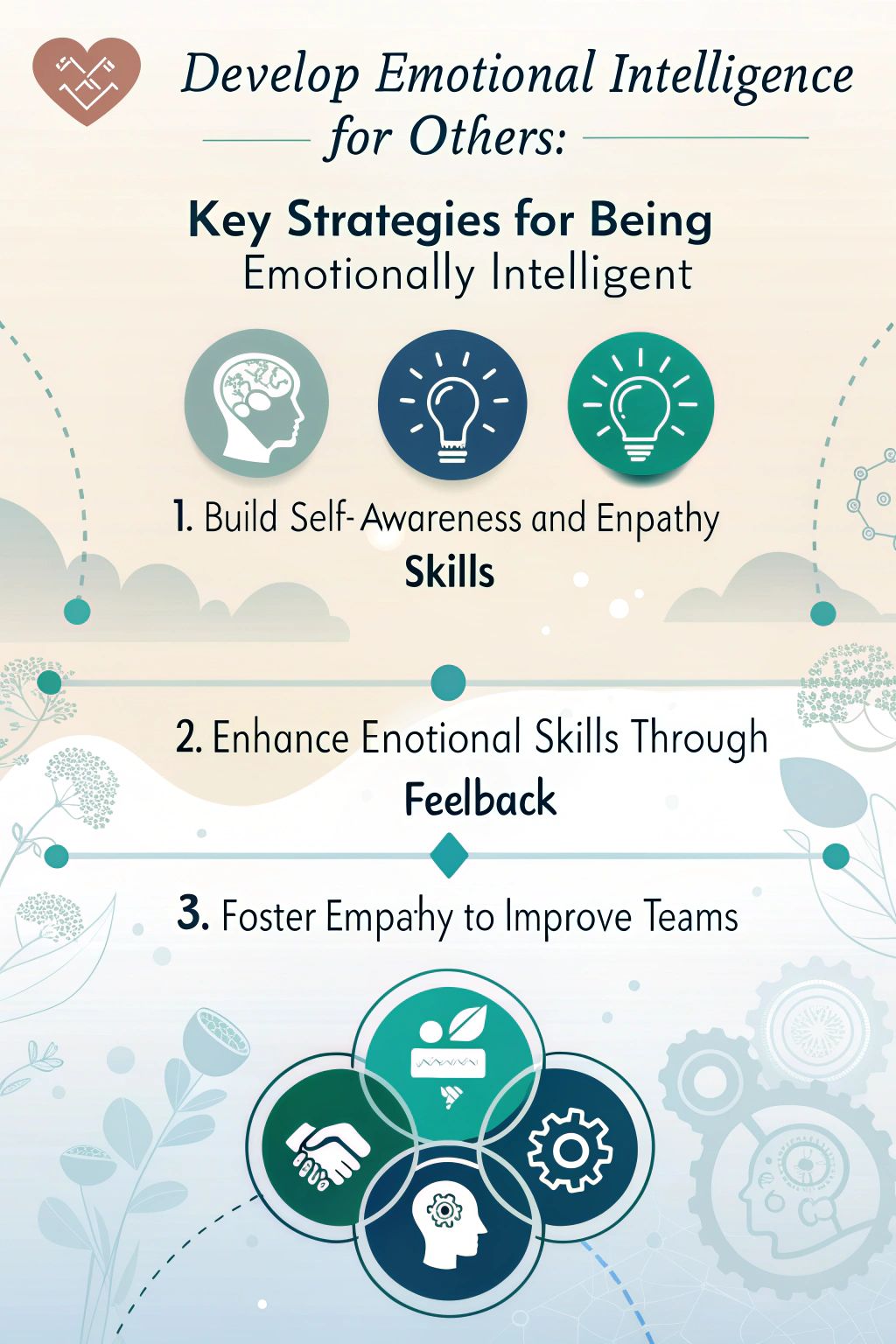Are you looking to boost your team’s performance and create a happier work environment? One key area you might not have considered is developing emotional intelligence for others. This ability can transform the way people interact within your organisation.
It’s about understanding and managing emotions effectively, both in yourself and those around you.
Recent studies show that 90% of top performers have high emotional intelligence. This fact highlights its importance in achieving excellence in any field. Our blog will guide you through the core skills needed for being emotionally intelligent.
We will also share strategies to enhance these skills in your colleagues or teams. Keep reading to learn how to become a more effective leader with emotional intelligence at your side.

Understanding Emotional Intelligence

Comprehending Emotional Intelligence involves acknowledging and controlling one’s emotions, as well as being sensitive to the feelings of others. It plays a pivotal role in personal and professional interactions, contributing to enhanced communication, teamwork, and effective leadership.
Definition of Emotional Intelligence
Emotional Intelligence, or EI, is the capability to acknowledge, control, and apply emotions in beneficial ways. This skill aids individuals in identifying not just their own emotions, but others’ as well.
It stands out from IQ as it assesses emotional aptitudes rather than intellectual abilities. The ability to manage personal emotions and interact successfully with others signifies someone as emotionally intelligent.
EI plays a pivotal role in individual development and career progression. Individuals with a high level of emotional intelligence harbour the knack to suppress impulses, converse effectively, find solutions amid tension, and connect with colleagues.
Such skills make them superior leaders and collaborative team members, reinforcing their proficiency to confront workplace adversities.
Importance in Personal and Professional Settings
Emotional intelligence serves a significant function in both our private lives and work environments. It moulds how we control our emotions, liaise with others, and form decisions.
In personal settings, elevated emotional intelligence aids us in solidifying relationships. We turn more sympathetic and better at comprehending others’ feelings. This results in profound connections with family and friends.
At work, emotional intelligence retains its significance. Research reveals that 90% of the best performers possess high levels of this skill. The reason is clear.
In professional surroundings, emotional intelligence fuels leadership victories and teamwork effectiveness. Leaders who exhibit empathy can fortify revenue, retain staff longer, and amplify productivity in their enterprises.
A Businessolver survey found that a majority of employees appreciate empathy but believe the workplace often disregards it. Thus, education in these skills has the potential to revolutionise a company’s culture for the better.
Core Emotional Intelligence Skills
Developing emotional intelligence involves refining fundamental skills like self-awareness, self-regulation, empathy, and social skills. Concentrating on understanding one’s emotions and their impact on others can greatly improve relational interactions and overall well-being. Enhancing these abilities enables individuals to navigate intricate social dynamics with greater ease and success.
Self-Awareness
Self-awareness is understanding your emotions and their impacts. Daniel Goleman notes its significant part in leadership. This ability allows you to perceive your strengths and weaknesses vividly.
It also contributes to enhanced decision-making as you comprehend how your emotions influence your actions. Through robust self-awareness, leaders can refrain from making hasty, impulsive decisions.
They maintain objectivity, preventing emotions from governing them.
Leaders who are highly familiar with themselves manage their emotions efficiently. This regulation prevents negative emotions from damaging work relationships or productivity. Being self-aware enhances the management of stress and difficulties at work.
It lays the groundwork for cultivating other emotional intelligence skills such as empathy and motivation as well.
Self-Regulation
Self-Regulation plays a key role in managing emotions effectively. It involves using strategies like deep breathing to calm oneself down. This skill allows people to handle stress better and stay in control when faced with emotional challenges.
Cognitive Behavioural Therapy (CBT) offers tools that help individuals learn coping mechanisms for these situations, improving their ability to regulate emotions.
Practicing self-regulation boosts one’s confidence and leads to healthier ways of expressing feelings. People who manage their emotions well can solve problems more efficiently and maintain positive relationships.
Mastering self-regulation enhances one’s emotional intelligence, making it easier to connect with others and influence them positively.
Empathy
Empathy is the skill of understanding and sharing someone else’s feelings. Leaders with empathy perform better in their roles. Research from DDI shows empathetic leaders outdo others by 40% in coaching, decision-making, and planning.
Yet, Psychology Today finds that only a tenth of people listen effectively. This skill lets us see things from another person’s point of view and understand their emotions.
Developing empathy involves active listening and recognising non-verbal cues like nodding or paraphrasing what the other person says to show understanding. It also means managing your reactions to align with another’s emotional state, fostering stronger relationships both in work environments and personal ones.
Empathetic leadership influences team morale positively, leading to improved job satisfaction across the workforce.
Motivation
Motivation is key in utilising emotions to reach personal and professional goals. Emotionally savvy leaders use motivation to keep a positive attitude and inspire their teams towards shared visions.
They grasp the effectiveness of emotion management methods to heighten team spirit and boost personal motivation.
These leaders create a setting where each person appreciates their work’s worth, linking daily tasks with overarching goals. This bond between personal input and collective victory cultivates a driven workforce aiming for perfection.
Through capable leadership, they inspire others to excel, boosting the overall performance of the organisation.
Social Skills
Social skills hold paramount significance for headships desiring the best performance from their teams. This set of skills includes relationship management and potent communication.
Headships possessing robust social capabilities can sway others in a favourable manner, crafting stronger bonds within their establishments. Large corporations place esteemed importance on these qualities, demonstrated by the fact that over 85% utilise 360-degree feedback to nurture such leadership attributes.
Possessing admirable social skills also encompasses comprehension of body language and incorporating feedback from others to refine communication techniques. This factor contributes to why emotionally intelligent leaders experience better results in crafting an inclusive work atmosphere where every team member feels appreciated and listened to.
Further development of these competencies cultivates a culture where motivation prospers, issues are resolved more effectively, and everyone cooperates well in pursuit of shared objectives.
Techniques to Enhance Emotional Intelligence in Others
Encouraging Reflective Journaling and implementing 360-Degree Feedback are effective strategies to enhance emotional intelligence in others. These techniques promote self-awareness and empathy, fostering a deeper understanding of emotions and enhancing interpersonal relationships.
Encouraging Reflective Journaling
Reflective journaling is a powerful tool for enhancing emotional intelligence in oneself and others. It involves regularly recording thoughts, emotions, and reactions to personal experiences.
By promoting reflective journaling, individuals can gain valuable insight into their emotions and thought processes, leading to improved self-awareness and emotional regulation. This practice also supports the development of empathy as individuals learn to understand their own feelings better, enabling them to empathise with others more effectively.
Structured programmes like Social and Emotional Learning (SEL) have been shown to enhance emotional competence through activities such as reflective writing exercises.
Encouraging the practice of reflective journaling helps individuals identify emotional triggers in daily interactions while providing an opportunity for introspection and personal growth.
When incorporating this technique, it is essential to emphasise its relevance in building emotional intelligence skills such as self-awareness, empathy, and self-regulation – fundamental components of effective leadership and interpersonal relations.
Reflective journaling is not only a personal growth strategy but also a potent tool for fostering emotionally intelligent behaviour in others within professional settings.
Implementing 360-Degree Feedback
Implementing 360-degree feedback is a widely embraced strategy for leadership development, with over 85% of FTSE 500 companies utilising it in this capacity. This tool involves gathering feedback from an individual’s superiors, peers, subordinates, and even themselves to provide a comprehensive assessment of their performance and leadership skills.
The CEO of Zenger Folkman, Jack Zenger, has notably referenced the usefulness of 360-degree feedback in the context of leadership development.
In practical terms, the process typically involves individuals receiving constructive feedback from multiple perspectives – including managers, colleagues, and direct reports – to gain insights into their strengths and areas for improvement.
By adopting this approach, leaders can leverage valuable data to identify blind spots or areas where they need further development while also understanding how their actions impact others within the organisation.
Promoting Active Listening Practices
Encouraging attentive listening in others is vital for fostering emotional intelligence. Attentive listening involves fully engaging with another person’s perspective, paraphrasing their points, and using non-verbal cues to demonstrate understanding.
Psychology Today estimates that only 10% of people listen effectively. Therefore, it’s essential to implement techniques such as reflective journaling and 360-degree feedback systems to cultivate attentive listening skills in individuals.
By providing a supportive environment for honing attentive listening practices, professionals can significantly enhance their ability to comprehend the emotions of others and communicate effectively.
Furthermore, nurturing attentive listening creates a supportive culture where individuals feel heard and understood. This process goes beyond simply hearing words; it includes grasping the feelings behind them.
Attentive listeners can build stronger relationships by genuinely connecting with colleagues on an emotional level, ultimately leading to improved collaboration and productivity within organisations.
Emphasising Mindfulness and Emotional Awareness
Mindfulness and emotional awareness play a pivotal role in developing emotional intelligence. Encouraging mindfulness practices, such as deep breathing and meditation, enables individuals to regulate their emotions effectively.
Research indicates that Cognitive Behavioural Therapy (CBT) is instrumental in acquiring coping mechanisms to navigate emotional challenges. Social and Emotional Learning (SEL) programmes have also demonstrated effectiveness in fostering emotional competence among participants.
Embracing mindfulness and nurturing emotional awareness provides individuals with the essential skills to comprehend their own emotions and those of others. These approaches can result in enhanced social interactions, increased empathy, and improved problem-solving capabilities.
In professional settings, promoting mindfulness techniques can contribute to establishing a conducive work environment where employees are supported in managing their emotions constructively.
By integrating these crucial elements into training programmes or leadership development initiatives, organisations can foster a culture that prioritises emotional well-being and cultivates robust interpersonal relationships within teams.
Ultimately, prioritising mindfulness and embracing emotional awareness forms the basis for nurturing emotionally intelligent individuals who are capable of handling diverse situations with resilience and composure.
The Role of Leadership in Fostering Emotional Intelligence
To enhance emotional intelligence in organisations, leadership is vital in establishing an emotionally intelligent organizational culture, training leaders to identify and cultivate emotional skills in teams, and endorsing emotional intelligence for managers.
For additional perspectives on boosting emotional intelligence within organizations, explore our blog further.
Creating an Emotionally Intelligent Organisational Culture
Additionally, the focus on emotional intelligence extends to empathetic leadership practices such as promoting reflective journaling, implementing 360-degree feedback mechanisms, and encouraging active listening within teams.
By creating an emotionally intelligent culture and providing practical tools for enhancing emotional skills in employees at all levels through training programmes or courses like the Society for Human Resource Management’s leadership principles course online can result in substantial benefits for individuals’ personal development and organisational performance.
Training Leaders to Recognise and Foster Emotional Skills in Teams
Emotional intelligence is an essential aspect of effective leadership, especially concerning team dynamics. Training leaders to recognise and promote emotional skills in teams can significantly improve overall performance.
According to DDI research, empathetic leaders perform 40% better in coaching, planning, and decision-making. Creating an emotionally intelligent organisational culture and implementing techniques such as reflective journaling and active listening practices can help leaders cultivate empathy within their teams.
Furthermore, Korn Ferry’s survey revealed that 79% of executives have at least one blind spot regarding their strengths and others’ perceptions. This underscores the importance of training leaders to be more self-aware and attuned to the emotions of those they lead.
When leaders are equipped with these emotional intelligence skills, it has a positive impact on the team’s cohesion and productivity while fostering a healthier work environment where employees feel valued and supported.
Emotional Intelligence for Managers
Managers play a crucial role in nurturing emotional intelligence within their teams. By establishing an environment that encourages self-awareness, empathy, and effective communication, managers can elevate the emotional intelligence of their team members.
Moreover, training programmes that focus on emotional intelligence have proven to be advantageous for leaders seeking to recognise and cultivate emotional skills in their teams.
Moreover, studies have shown that employees with higher levels of emotional intelligence tend to demonstrate stronger leadership qualities. Introducing techniques such as reflective journaling and 360-degree feedback can assist in enhancing the overall emotional intelligence of both managers and their teams.
By prioritising these strategies, managers can cultivate an organisational culture that values and fosters emotional intelligence, ultimately leading to improved team dynamics and performance.
Conclusion
Developing emotional intelligence in others is crucial for creating a positive and effective work environment. By comprehending and enhancing emotional intelligence skills such as self-awareness, empathy, and self-regulation, leaders can inspire and motivate their teams to achieve greater success.
Practical strategies like active listening, providing constructive feedback, and promoting team-building activities are vital for nurturing emotional intelligence in the workplace.
Professional development programs can also play an important role in equipping individuals with the skills necessary to navigate complex social dynamics and lead effectively. Ultimately, prioritising emotional intelligence enables individuals to build stronger connections, communicate more effectively, and drive enhanced performance within their teams.
MindOwl Founder – My own struggles in life have led me to this path of understanding the human condition. I graduated with a bachelor’s degree in philosophy before completing a master’s degree in psychology at Regent’s University London. I then completed a postgraduate diploma in philosophical counselling before being trained in ACT (Acceptance and commitment therapy).
I’ve spent the last eight years studying the encounter of meditative practices with modern psychology.

